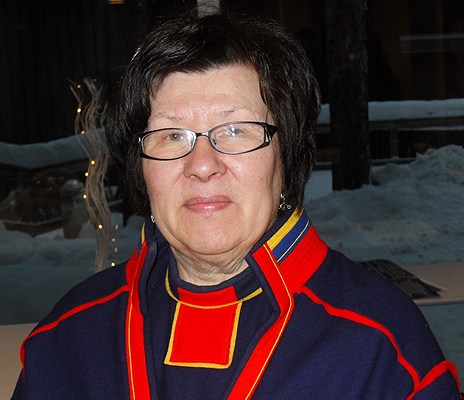Swedish Sami Parliament Demands More Powers
 In a new report to be sent to the Swedish government in May, the Sami Parliament in Kiruna will demand greater self determination for the country’s indigenous people.
In a new report to be sent to the Swedish government in May, the Sami Parliament in Kiruna will demand greater self determination for the country’s indigenous people.
But how united are Sweden’s estimated 20,000 Sami? How many feel represented by their parliament?
Today only about one in ten Sami have traditional land rights but their parliament in Kiruna is still dominated by land-related divisions and disputes.
Listen: {play}/media/jukebox/rs-samipolref.MP3
In a new report to be sent to the Swedish governmentin May, the Sami Parliament will demand greater self determination for the country’s indigenous people. But how united are Sweden’s estimated 20.000 Sami? How many feel represented by the parliament? And how likely is it that the government will grant more powers beyond the reindeer industry? Tom Sullivan filed this report. Lägg till i spelkö Spara som favoritklipp Dela Facebook Twitter Digg Delicio.us Direktlänk till ljudet Bädda in ljudet Öppna i spelaren
Only herders have land rights
Although only 5 percent of the Sami are reindeer herders, they occupy 55 percent of the seats in the Sami Parliament.
“Swedish legislation has given the limited rights that indigenous people have to land and water use to the reindeer herders,” explains Peter Sköld, head of the Centre for Sami Research at Umeå University.
And that gives them a better political ground to speak from – the others are totally excluded.”
Since 2007 the Sami Parliament has responsibility for the reindeer industry in Sweden. But the president of the parliament, Ingrid Inga, says that’s not enough – she says the government must fully recognise the Sami people’s right to decide over their own affairs.
“We want reforms that give us powers over areas that affect us – language, education, land use and so on. We need this so that the parliament becomes a real decision making body and not just the state agency which we are at the moment,” she tells Radio Sweden.
Less power than a county council
The Sami parliament has less power than a Swedish county council and is not formally consulted by the Swedish government, despite being in existence for almost two decades.
“There has been a process over the last two decades where we first set up a Sami Parliament and then gave it responsibility for reindeer husbandry and now school boards,” says Eskil Erlandsson, the Swedish government minister responsible for Sami affairs.
“We made a proposal [about consultation] two years ago and the Sami parliament refused it and said they wanted to think about it before deciding if they would accept the proposal.”
UN criticism of Sweden
Sweden came in for heavy criticism from the UN special rapporteur on indigenous people earlier this year – particularly regarding the lack of say the Sami have over applications for prospecting, mining, forestry and wind power projects.
“Sweden has ratified international conventions and recognised the Sami as an indigenous people. But in my view the Swedish parliament is not ready or mature enough to let the Sami have self determination,” says Sami President Ingrid Inga.
Now, two years after rejecting a government report, which they say there were not consulted on, the members of the Sami Parliament have agreed on a set of proposals for extra powers and a change to the divisive system which accords land rights to just a tiny minority.
Getting agreement has not been easy and convincing the Swedish government to grant more powers may be even harder.
However Peter Sköld, at the Centre for Sami Research in Umeå, believes that external criticism of Sweden from the UN, the Council of Europe and others will eventually have an effect on the Swedish government. Ignoring indigenous demands for greater rights does not sit well with the Swedes self image.
But first, he says, the Swedes need to become more aware that there is a problem.
“We suffer from a lack of knowledge about our own indigenous people. We know quite a lot about indigenous people in other parts of the world and we address criticism to foreign governments about how they handle their situations. But we’re not aware of the problems here.”



